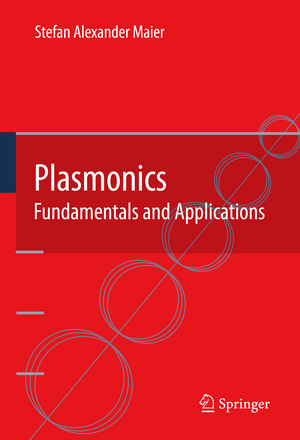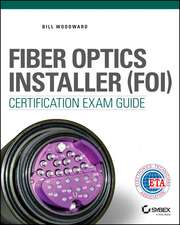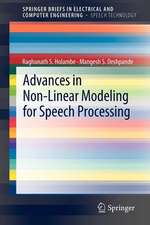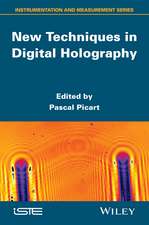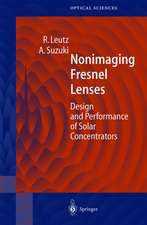Plasmonics: Fundamentals and Applications
Autor Stefan Alexander Maieren Limba Engleză Hardback – 15 mai 2007
The first part of the book describes the fundamentals of this research area, starting with a review of Maxwell’s equations in a form suited to the description of metals. Subsequent chapters introduce the two major ingredients of plasmonics, surface plasmon polaritons at metallic interfaces and localized plasmons in nanostructures. The mathematics of their description, excitation and imaging of the modes are discussed. This part closes with a presentation of electromagnetic surface waves at lower frequencies in the THz and microwave regime, comprising both spoof or designer plasmons and surface phonon polaritons.
Building on the fundamentals, the second part discusses some of the most prominent applications of plasmons: Plasmon waveguides, extraordinary transmission through aperture arrays, sensing and surface enhanced Raman scattering, spectroscopy as well as metamaterials. Exemplary studies in each of these fields taken from the original literature are presented.
| Toate formatele și edițiile | Preț | Express |
|---|---|---|
| Paperback (1) | 1209.34 lei 6-8 săpt. | |
| Springer Us – 29 oct 2010 | 1209.34 lei 6-8 săpt. | |
| Hardback (1) | 1215.81 lei 6-8 săpt. | |
| Springer Us – 15 mai 2007 | 1215.81 lei 6-8 săpt. |
Preț: 1215.81 lei
Preț vechi: 1482.69 lei
-18% Nou
Puncte Express: 1824
Preț estimativ în valută:
232.64€ • 243.55$ • 192.50£
232.64€ • 243.55$ • 192.50£
Carte tipărită la comandă
Livrare economică 05-19 aprilie
Preluare comenzi: 021 569.72.76
Specificații
ISBN-13: 9780387331508
ISBN-10: 0387331506
Pagini: 223
Ilustrații: XXVI, 224 p.
Dimensiuni: 155 x 235 x 19 mm
Greutate: 0.54 kg
Ediția:2007
Editura: Springer Us
Colecția Springer
Locul publicării:New York, NY, United States
ISBN-10: 0387331506
Pagini: 223
Ilustrații: XXVI, 224 p.
Dimensiuni: 155 x 235 x 19 mm
Greutate: 0.54 kg
Ediția:2007
Editura: Springer Us
Colecția Springer
Locul publicării:New York, NY, United States
Public țintă
ResearchCuprins
Fundamentals of Plasmonics.- Electromagnetics of Metals.- Surface Plasmon Polaritons at Metal / Insulator Interfaces.- Excitation of Surface Plasmon Polaritons at Planar Interfaces.- Imaging Surface Plasmon Polariton Propagation.- Localized Surface Plasmons.- Electromagnetic Surface Modes at Low Frequencies.- Applications.- Plasmon Waveguides.- Transmission of Radiation Through Apertures and Films.- Enhancement of Emissive Processes and Nonlinearities.- Spectroscopy and Sensing.- Metamaterials and Imaging with Surface Plasmon Polaritons.- Concluding Remarks.
Recenzii
From the reviews:
"A book which gives an overview of plasmonics, an area of physics that could revolutionise computing and telecommunications over the next two decades … . The book, the product of one year’s work, is one of first modern overviews of plasmonics since the 1980s and is aimed at those starting in the field and experienced researchers as well." (www.huliq.com, May, 2007)
"This book serves as an exceptionally accessible entrée into a 100-year-old field that continues to provide new surprises. … In about 200 pages, the author succeeds in communicating both the basic knowledge that is required for one to enter this research area and the excitement of new challenges and opportunities in the field. … this book demonstrates an exact fitness for its purpose, which is to provide a ‘useful tool for both current and future participants in this area.’" (K. Alan Shore, Optics and Photonics News, October, 2008)
"The book ‘Plasmonics, fundamentals and application’ by S.A. Maier presents an appealing up to date description of the interaction of light with nanoparticles, from concepts to recent discoveries. It is a very good introduction to the field for graduate or undergraduate students." (Luc Henrard, Physicalia Magazine, Vol. 30 (4), 2008)
"Maier’s work a very timely and welcome addition to any bookshelf. … The subject material is well organized, and clearly presented throughout, with abundant references to the primary literature. … any undergraduate student doing a final year project on plasmonics will undoubtedly find this text extremely helpful. Furthermore, lecturers will also find it useful … . In short, Stefan Maier’s text is very well written and fills a real gap in the market." (Mark Fox, Contemporary Physics, Vol. 50 (4), July-August, 2009)
"A book which gives an overview of plasmonics, an area of physics that could revolutionise computing and telecommunications over the next two decades … . The book, the product of one year’s work, is one of first modern overviews of plasmonics since the 1980s and is aimed at those starting in the field and experienced researchers as well." (www.huliq.com, May, 2007)
"This book serves as an exceptionally accessible entrée into a 100-year-old field that continues to provide new surprises. … In about 200 pages, the author succeeds in communicating both the basic knowledge that is required for one to enter this research area and the excitement of new challenges and opportunities in the field. … this book demonstrates an exact fitness for its purpose, which is to provide a ‘useful tool for both current and future participants in this area.’" (K. Alan Shore, Optics and Photonics News, October, 2008)
"The book ‘Plasmonics, fundamentals and application’ by S.A. Maier presents an appealing up to date description of the interaction of light with nanoparticles, from concepts to recent discoveries. It is a very good introduction to the field for graduate or undergraduate students." (Luc Henrard, Physicalia Magazine, Vol. 30 (4), 2008)
"Maier’s work a very timely and welcome addition to any bookshelf. … The subject material is well organized, and clearly presented throughout, with abundant references to the primary literature. … any undergraduate student doing a final year project on plasmonics will undoubtedly find this text extremely helpful. Furthermore, lecturers will also find it useful … . In short, Stefan Maier’s text is very well written and fills a real gap in the market." (Mark Fox, Contemporary Physics, Vol. 50 (4), July-August, 2009)
Notă biografică
Stefan Maier was born Germany in 1975. After studying physics at Technische Universitaet Muenchen (TU Munich), he received a Master of Science in Applied Physics at the California Institute of Technology (Caltech) in Pasadena. In 2003, he obtained a PhD in Applied Physics at the same institute for work on metal nanoparticle plasmon waveguides. After a short postdoctoral period, he joined the University of Bath in 2004 as a lecturer. He is currently a Reader in the Department of Physics at Bath, and a member of the University's Centre for Photonics and Photonic Materials CPPM.
SM's main research area is plasmonics and near-field optical microscopy, and his work has over the last 5 years attracted more than 450 citations. Apart from research, he is also very active in organizing symposia on plasmonics at international conferences (MRS, E-MRS), and has recently taught a summer school on nanophotonics in the Czech Republic.
SM's main research area is plasmonics and near-field optical microscopy, and his work has over the last 5 years attracted more than 450 citations. Apart from research, he is also very active in organizing symposia on plasmonics at international conferences (MRS, E-MRS), and has recently taught a summer school on nanophotonics in the Czech Republic.
Textul de pe ultima copertă
Considered one of the major fields of photonics of the beginning 21st century, plasmonics offers the potential to confine and guide light below the diffraction limit and promises a new generation of highly miniaturized photonic devices. Offering both a comprehensive introduction to the field and an extensive overview of the current state of the art, "Plasmonics: Fundamentals and Applications" should be of great value to the newcomer and to the experienced researcher.
The first part of the book describes the fundamentals of this research area, starting with a review of Maxwell’s equations in a form suited to the description of metals. Subsequent chapters introduce the two major ingredients of plasmonics, surface plasmon polaritons at metallic interfaces and localized plasmons in nanostructures. The mathematics of their description, excitation and imaging of the modes are discussed. This part closes with a presentation of electromagnetic surface waves at lower frequencies in the THz and microwave regime, comprising both spoof or designer plasmons and surface phonon polaritons.
Building on the fundamentals, the second part discusses some of the most prominent applications of plasmons: Plasmon waveguides, extraordinary transmission through aperture arrays, sensing and surface enhanced Raman scattering, spectroscopy as well as metamaterials. Exemplary studies in each of these fields taken from the original literature are presented.
The first part of the book describes the fundamentals of this research area, starting with a review of Maxwell’s equations in a form suited to the description of metals. Subsequent chapters introduce the two major ingredients of plasmonics, surface plasmon polaritons at metallic interfaces and localized plasmons in nanostructures. The mathematics of their description, excitation and imaging of the modes are discussed. This part closes with a presentation of electromagnetic surface waves at lower frequencies in the THz and microwave regime, comprising both spoof or designer plasmons and surface phonon polaritons.
Building on the fundamentals, the second part discusses some of the most prominent applications of plasmons: Plasmon waveguides, extraordinary transmission through aperture arrays, sensing and surface enhanced Raman scattering, spectroscopy as well as metamaterials. Exemplary studies in each of these fields taken from the original literature are presented.
Caracteristici
ONLY book that covers the whole subject of plasmonics, including the newest research and emerging technological applications Clear description of the underlying physics Suitable both for the active researchers and for undergraduate education Includes supplementary material: sn.pub/extras
